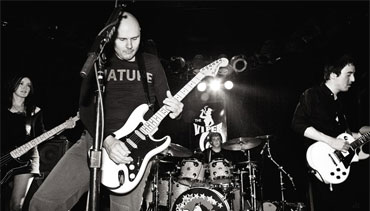The S+V Interview: Billy Corgan Page 2

What do you make of the music industry today as you try to navigate your way through essentially uncharted territory?
It’s wild. It’s the Wild West. If you look for the last real Wild West period of music, it was probably the changeover from singles to LPs when the Beatles were the focus. So as a business, we haven’t been in this position for almost 50 years. Everything has just melted.
Where would you pinpoint the current shift getting under way? The turn of the century?
I first thought of it in the late 1990s, but I didn’t know what it meant. It was a cyclical downturn, the looking in at the lens. I’m sort of a music historian, so when the boy bands came in hard [Backstreet Boys, ’NSync, et al.], I thought, “It’s the Jackson 5 and the Osmonds again. It’ll last 2 or 3 years, burn itself through, and then go away.”
But if you had certain social qualifications and could become a reality TV star, then your musicianship became part of a bigger story. You saw a massive shift at the end of the ’90s in terms of how information was being shared, and it changed the way stars were evaluated. Once you go down that rabbit hole, you’re not coming back out. You’re not going to have James Taylor there in a blue jean jacket just playing guitar. Those days are over. There’s got to be something else; either you’ve got to have a problem or a hot girlfriend.
And that changed the emphasis focus. I’d been complaining to someone about something of mine that hadn’t been appreciated, and they said, “Hey, you’re supposed to be good. You being good is not noteworthy. We’re only going to notice if there’s something else. Whatever your horizon point is, if you’re above it, then maybe we’ll pay attention.”
As an artist still interested in creating and distributing new music, what do you do in this era? What do your goals become? Do you build your own world?
You build your own world with your own rules. And people will visit it, believe me.
How do I ascertain success in the modern era? I just feel it. I have to feel it. There’s more positive energy around Smashing Pumpkins now than there’s been probably since the mid-’90s. I can just feel the way people are interrelating with me.
When people focus on personal, TMZ kind of stuff and not the music or the art, does that bother you?
What’s difficult is that I grew up in a value-based culture. It was about how you played guitar, what effects you used, your hair, your clothes. But now, how do you determine what something is worth? On MySpace, one band can have a million friends but can’t sell 5,000 records. Then you have another band that has 100,000 friends, and it sells 60,000 records. So whose friends are better friends?
When we were on MySpace, we found a 100:1 ratio of friends to albums sold. 100:1! If you’re a reasonable person, you step back and say, “What is it to those other 99 people that we’re not doing right? What are we doing wrong?” I would ask fans, “Did you buy the new album?” They’d say, “No.” “Why?” “I don’t know, I heard it wasn’t any good.” And then I’d ask, “How did you know it was out?” “Oh, I knew it was out right away because you guys sent me an e-mail blast.” But the next person says, “Oh, I didn’t even know it was out.” And then the next person goes, “Yeah, I was interested in buying it, but you kept sending me e-mail blasts and it pissed me off. I got turned off.” So it’s hard to put stock into just one thing.
I had a Web guy for a while, not a very creative person, who ultimately got fired. At one point he wanted a raise, and I said to him, “You haven’t grown the Web site. When I write a song that becomes a hit song, I sell more tickets and more records. It’s a results-oriented business. So if 10,000 people visit the site every day and 6 months later there’s only 9,000 people visiting the site, that’s a real thing. I can’t guess what they’re thinking, I can just see the numbers.” He said, “Well, if you would visit the site more often or post something, then our numbers would go way up.” I replied, “Yeah, but there’s a reason they don’t put somebody on TV 24 hours a day. It’s the Scarcity Principle.”
You and I are both working with a quality business model. We say, “If you want it cheap and you want it trashy, go somewhere else. Here, we use better hot dogs — and our French fries take longer to make, but they’re worth the wait.” It’s a quality issue.
So let’s say you have an article series about subwoofers, and your readership goes up and Web hits go up. The smart guy will say, “Well, let’s do more of that.” But you’re not going to give the whole magazine over to that topic. You’ve got to pick your spots.
- Log in or register to post comments





























































